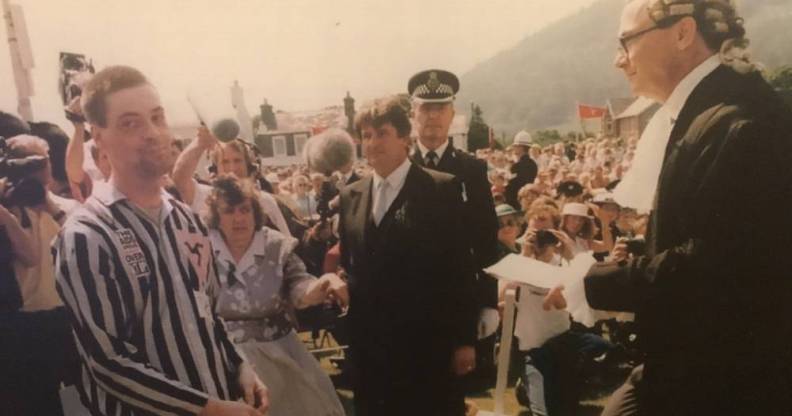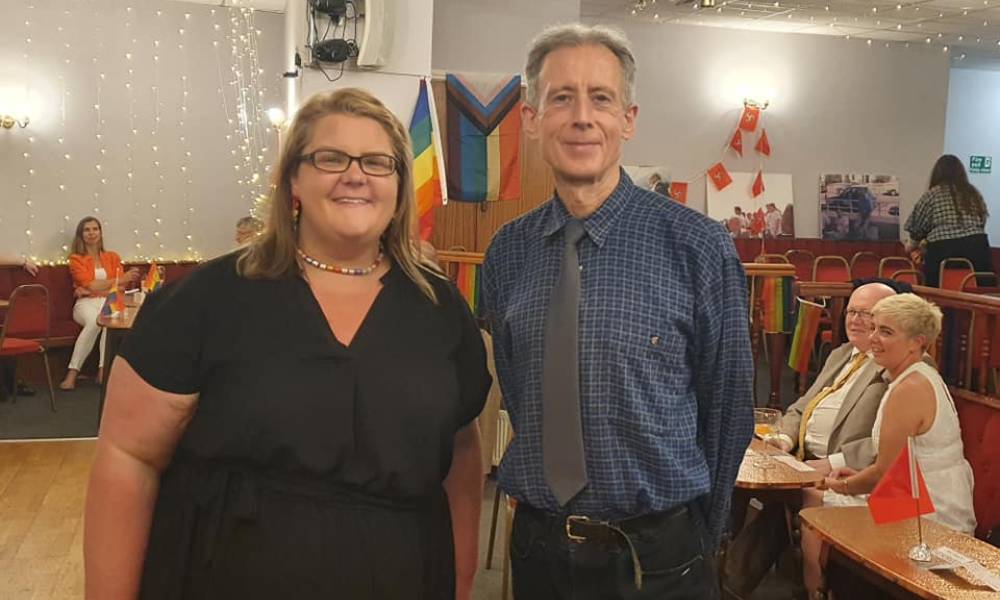How a fearless activist forced Isle of Man to end its gay sex ban – and why his fight isn’t over

Local gay campaigner Alan Shea protested against the Manx laws and the dicriminalisation of homosexuality at Tynwald Day in 1991. (Provided)
In 1991, a controversial gay rights protest rocked the Isle of Man, eventually leading to a partial decriminalisation of homosexuality. Thirty years on, the same campaigner is continuing his fight for justice.
On 10 July, 1991, local gay rights campaigner Alan Shea, supported by activists from LGBT+ group OutRage! In London, demanded the end of the Isle of Man’s homosexuality ban.
Although homosexuality was partially decriminalised in England and Wales in 1967, followed by Scotland and Northern Ireland in the early ’80s, sex between men remained punishable by life imprisonment on the Isle of Man until 1992.
The island is a crown dependency and maintains autonomy from the UK on issues such as marriage (it would go on to legalise same-sex marriage in 2016).
Shea handed over a petition calling for change wearing a striped uniform like that of Nazi concentration camp victims, causing an uproar on the island.
According to the Guardian, Shea customised a set of striped Marks & Spencer pyjamas with a pink triangle, which the Nazis used to mark out LGBT+ people. He modified the pink triangle to include the Isle of Man’s three-legged symbol and included the government’s phone number as a “prisoner number”.
Shea was “jeered by crowds”, LGBT+ activist Peter Tatchell recalled at an event to mark the 30th anniversary of the protest on Saturday (10 July).
Tatchell described him as a “hero of the LGBT+ freedom struggle”.

Peter Tatchell poses with Isle of Man gay campaigner Alan Shea at an event to mark the 30th anniversary of Shea’s protest on Tynwald Day on 10 July 2021. (Provided)
Shea’s courageous actions drew attention to the persecution of LGBT+ people on the Isle of Man, leading to political and legal reform for the crown dependancy. His pyjamas are even housed in a local museum as a historical artefact, highlighting the significance of his protest.
Thirty years to the day from the protest, and Tatchell joined Shea to call for Isle of Man police chief constable Gary Roberts to “stop stalling” and “apologise for the past police persecution of gay and bisexual men”.
While the Isle of Man’s chief minister Howard Quayle issued an “unqualified apology” last year to gay men convicted of same-sex offences before the law was changed in 1992, Tatchell wants the police to “go the next step”.
“This persecution caused immense suffering, including at least two suicides,” Tatchell said at Saturday’s event. “The parliament has apologised, so why can’t the police?”
Alan Shea said there has been “huge progress” in securing LGBT+ rights “over the years”, but “there is work still to be done on the Isle of Man”.
Isle of Man’s gay pardon bill in limbo
Apologising for the historic arrests in 2020, Quayle said he could not erase “past injustice” but hoped new legislation would “start to heal some of the pain”.
“We will never know the hurt our past laws may have inflicted on our own people,” Quayle said. “How many suffered; how many perhaps took their own lives and how many left their island never to return.”
His words marked the third reading of the Sexual Offences and Obscene Publications Bill 2019. Under the bill, men sentenced under previous laws would receive an automatic pardon and can apply to have convictions cleared from their record.
According to the BBC, although both the House of Keys and Legislative Council passed the bill, it is yet to become law.
England and Wales passed a similar law in 2017, known as the Alan Turing law. Scotland also enacted similar legislation in 2019.

Peter Tatchell poses with Clare Barber, Member of the House of Keys, the Isle of Man parliament, on 10 July 2021. Barber helped organise the first public Pride on the island. (Provided)
The Isle of Man Constabulary told PinkNews Roberts would not be making any further comments in response to the comments by Tatchell, but noted that he responded to the chief minister’s apology at the time on Twitter.
The IOM Today reported at the time that Roberts welcomed the move and said it was “entirely right” for the Isle of Man to apologise.

